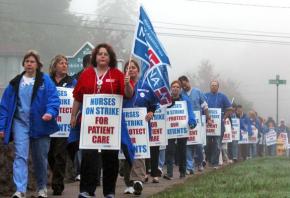One-day strike highlights nurses’ grievances
reports on a one-day strike by nurses in Western Massachusetts that won strong strong community support for their fight against corporate greed.
NURSES AT the Baystate Franklin Medical Center in Greenfield, Mass., held a one-day strike October 5 to highlight their struggle for a fair contract.
After 28 fruitless bargaining sessions between Baystate Health Systems (BHS) and the Massachusetts Nurses Association (MNA), the MNA kicked off its 24-hour strike at 7 a.m. with a protest in front of the hospital. Two days before, about 100 nurses, labor advocates and representatives of other local unions and community organizations gathered for a picket to show their support for the MNA.
As nurses walked the picket line on October 5, many expressed their disgust with BHS and its corporate greed. "[We want] a safe staff-to-patient ratio, a fair contract and, most of all, to secure patients' safety," explained registered nurse Karen Boyden.
Both the strike and picket succeeded in reaching out to the community about the importance of the nurses' struggle. According to MNA community organizer Leo Maley, about 600 community members came to the picket line during the 24-hour strike to show their support.

Carl, another nurse on strike, echoed Karen's remarks. "We're here because we¹re fighting for patient safety," he said. "They want to take away the fact that they pay time-and-a-half to keep us on overtime, working 16-hour shifts taking care of critically ill patients."
Union nurses at BHS also must pay from $2,000 to $3,000 more for their health benefits than nonunion employees, according to Carl. What's more, BHS owns the insurance company that employees are forced to use.
The nurses were compelled to call the strike because BHS management is demanding concessions that would essentially eliminate collective bargaining rights for the nurses. Negotiations began last October, but management has refused to budge on its demand that, after the first year of the contract, nurses would receive whatever wage increases granted to nonunion employees. This means that nurses would lose their right to bargain over wages in the future.
Plus, hospital administrators want to eliminate daily overtime after eight hours per day and only begin paying when nurses work over 40 hours in a week. In a setting where the majority of nurses are hired for less than 40 hours a week, forced overtime to fill holes in the schedule and provide adequate staffing is the norm. The hospital's plan to change when overtime pay kicks in will amount to a pay cut for most nurses.
Management is also asking for the right to subject nurses to penalties for taking more than four sick days in a year, an alarming demand considering the risks to patients if ill nurses are required to show up.
The drive by BHS administrators to force such concessions on the nurses is especially insulting considering the immense resources that BHS commands. In the last fiscal year, BHS took in almost $1.5 billion, while BHS CEO Mark Tolosky "earned" $1.9 million, making him the second-highest-paid health care CEO in New England.
In February, BHS inaugurated a new 640,000-foot, $250 million expansion at Baystate Medical Center, calling it "the hospital of the future." BHS--a vast conglomeration of "non-profit" and for-profit operations--is one of the largest health care systems in New England and the largest private employer in Western Massachusetts. But of its more than 10,000 employees, only the 210 RNs at Franklin Medical Center and 58 at the Visiting Nurses Association are unionized.
Solidarity with the nurses will be essential to making sure that they receive the dignity on the job that they deserve. It's clear that BHS can afford to give them a fair contract, and we should be prepared to stand with the nurses until they do.


